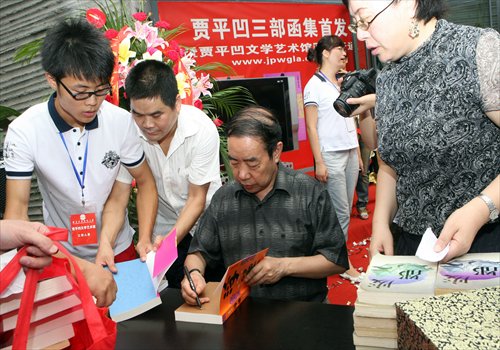 |
|
Chinese author Jia Pingwa signs copies of his book Fei Du and others for readers at a university in Xi'an in 2009. Photo: CFP
|
In 1993, the heavyweight contemporary author Jia Pingwa published his first urban life novel Fei Du (The Abandoned Capital) telling a story of an intellectual's life in the 1980s. The novel was soon banned for explicit sexual content and its "vulgar style" but was re-released 17 years later in 2009.
Now, Hu Zongfeng, a professor from Northwest University based in Xi'an, has recently finished his first draft of a translation with his English partner Robin Gilbank and is contacting overseas publishers to promote the book.
This is the second book of Jia Pingwa to be translated into English and expectations for it in international literary circles are high. One reason is because its French version has already won a literature prize.
The controversial book
The story happens in Xi'an, the capital of Shaanxi province, where Jia stayed for over 20 years since attending college there. The city is also referred to by some as the Abandoned Capital, the same name as Jia's novel. Xi'an was Middle Kingdom's capital before 756, and was gradually ignored by the ancient emperors.
With its famous terracotta warriors forever standing at the ready, Xi'an is a rich cultural center with a deep historical background.
The book tells of a writer, Zhuang Zhidie (translated as Butterfly by Hu), who gradually loses himself in his idle daily life and becomes decadent in his cultural city during the 1980s when China was in the early process of urbanization and modernization.
He keeps different relationships with four women including his wife. The vivid description of life among intellectuals and the explicit sexual content attracts both praise and criticism. Some have labeled it as the modern version of Plum in the Golden Vase (or Jin Ping Mei), a pornographic novel from the Ming Dynasty (1368-1644).
According to the postscript, Jia wrote the book in his 40s, after a series of miserable life experiences: He calls it "a work of misery."
"The Abandoned Capital is a powerful novel to tell the psychology of contemporary Chinese people as the society experienced rapid development and the reform," said Hu, "even reading it today, we can still feel the novel is so profound and straight to the point. Though it was banned in the Chinese mainland, it grabs overseas attention."
Jia was conferred with a medal granting him the title of Knight of Arts and Literature by the French Ministry of Culture and Communication in 2003.
